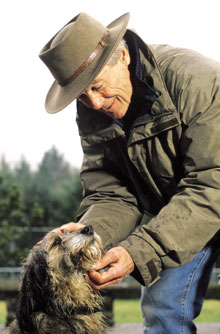THE OLD MAN AND THE DOG
By Catherine Moore
 Dad had been a lumberjack. He had entered grueling lumberjack competitions, and the shelves in his house were filled with trophies that attested to his prowess.
Dad had been a lumberjack. He had entered grueling lumberjack competitions, and the shelves in his house were filled with trophies that attested to his prowess.
The years marched on relentlessly. The first time he couldn’t lift a heavy log, he joked about it; but later I saw him straining to lift it. He became irritable whenever anyone teased him about his advancing age.
At sixty-seven, he had a heart attack. He was lucky; he survived. But something inside Dad died. His zest for life was gone. Offers of help were turned aside with sarcasm. The number of visitors finally stopped. Dad was left alone.
My husband, Dick, and I asked Dad to come live with us on our small farm. We hoped the fresh air and rustic atmosphere would help him adjust. Within a week, I regretted the invitation. He criticized everything I did. I became frustrated and moody. Alarmed, Dick set up weekly counseling appointments for us. At the close of each session we prayed, asking God to soothe Dad’s troubled mind.
I drove to the animal shelter that afternoon. Each pen contained five to seven dogs. As I neared the last pen a dog in the shadows of the far corner struggled to his feet, walked to the front and sat down. He was a pointer, one of the dog world’s aristocrats. But this was a caricature of the breed.
Years had etched his face and muzzle with shades of gray. His hipbones jutted out in lopsided triangles. But it was his eyes that caught and held my attention. Calm and clear, they beheld me unwaveringly. I pointed to the dog. The kennel officer shook his head. “He appeared out of nowhere and sat in front of the gate. We brought him in, figuring someone would be right down to claim him. That was two weeks ago and we’ve heard nothing. His time is up tomorrow.”
“You’re going to kill him?”
“Ma’am,” he said gently, “we don’t have room for every unclaimed dog.” I looked at the pointer again. The calm brown eyes awaited my decision. “I’ll take him,” I said.
I drove home with the dog on the front seat beside me. When I reached the house I honked the horn twice. I was helping my prize out of the car when Dad shuffled onto the front porch. “Look what I got for you, Dad!”
Dad wrinkled his face in disgust. “If I had wanted a dog I would have gotten one. And I would have picked out a better specimen than that bag of bones.”
Anger rose inside me. “You’d better get used to him, Dad. He’s staying!”
We stood glaring at each other like duelists, when suddenly the pointer
pulled free from my grasp. He wobbled toward my dad and sat down in front of him. Then slowly, carefully, he raised his paw.
Dad’s lower jaw trembled as he stared at the uplifted paw. Confusion
replaced the anger in his eyes. The pointer waited patiently. Then Dad was on his knees hugging the animal.
It was the beginning of a warm and intimate friendship. Dad named the
pointer Cheyenne. Together he and Cheyenne spent long hours walking down dusty lanes. They spent reflective moments on the banks of streams, angling for tasty trout. They even started to attend Sunday services together, Dad sitting in a pew and Cheyenne lying quietly
at his feet.
Dad’s bitterness faded, and he and Cheyenne made many friends. Then late one night I was startled to feel Cheyenne’s cold nose burrowing through our bed covers. He had never before come into our bedroom at night. I woke Dick, put on my robe and ran into my father’s room. Dad lay in his bed, his face serene. But his spirit had left quietly sometime during the night.
Two days later my shock and grief deepened when I discovered Cheyenne lying dead beside Dad’s bed. I wrapped his still form in the rag rug he had slept on. As Dick and I buried him near a favorite fishing hole, I silently thanked the dog for the help he had given me in restoring Dad’s peace of mind.
The morning of Dad’s funeral dawned overcast and dreary. This day looks like the way I feel, I thought, as I walked down the aisle to the pews reserved for family. I was surprised to see the many friends Dad and Cheyenne had made filling the church. The pastor began his tribute to both Dad and the dog that had changed his life. And then the pastor turned to Hebrews 13:2. “Do not neglect to show hospitality to strangers, for by this some have entertained angels without knowing it.”
For me, the past dropped into place, completing a puzzle that I had not seen before: the sympathetic voice that had just read the right article. Cheyenne’s unexpected appearance at the animal shelter, his calm acceptance and complete devotion to my father, and the proximity of their deaths. God had answered my prayers, after all.









